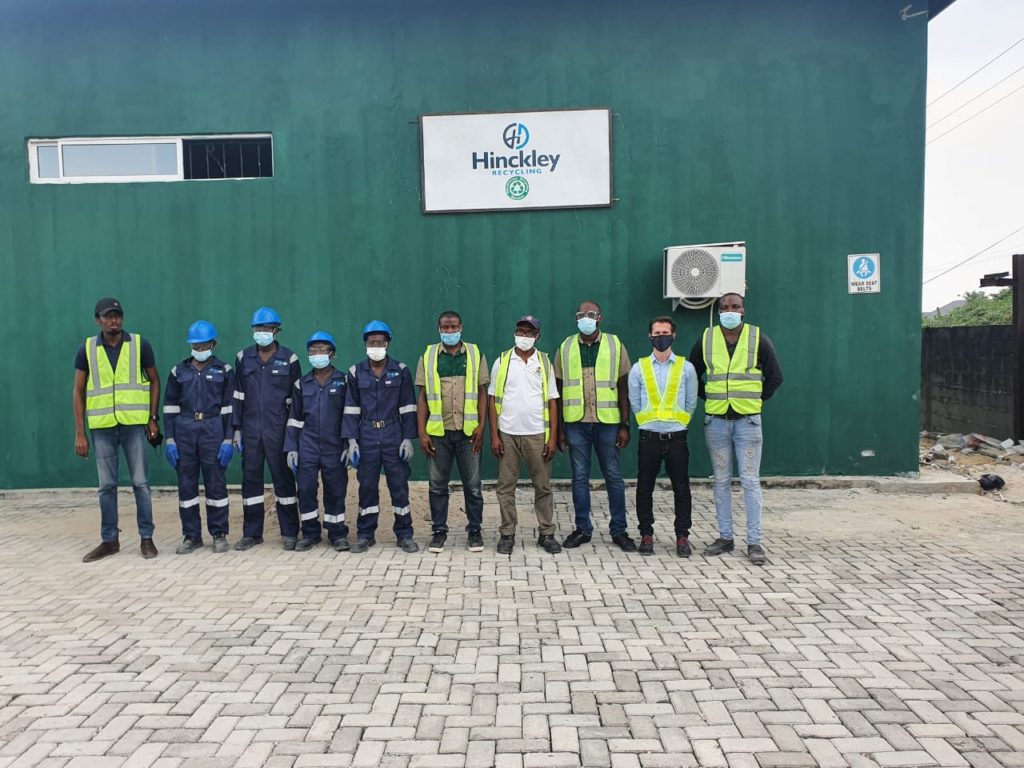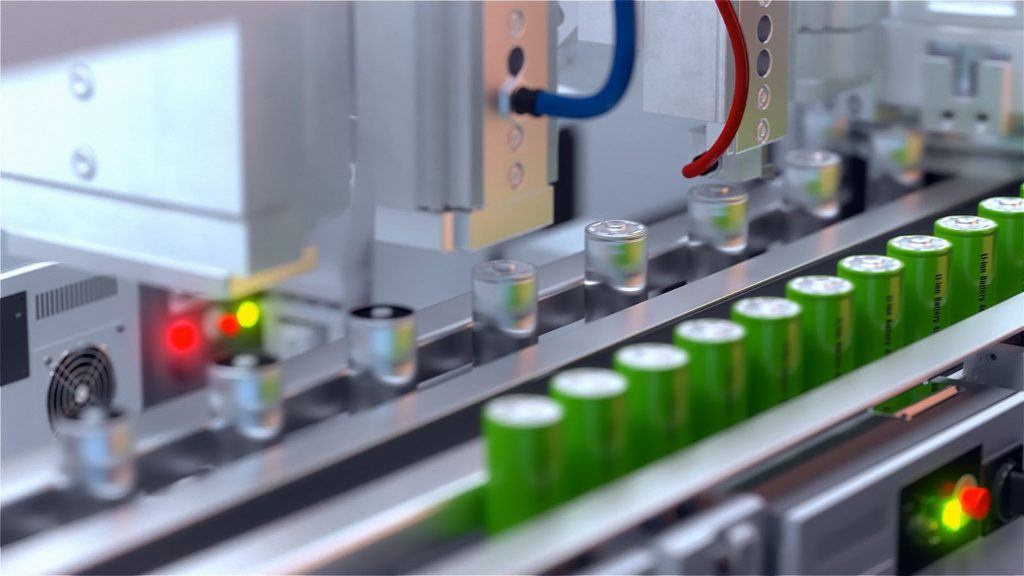
Hinckley Recycling, in partnership with Innovate UK KTN as part of their Global Alliance Africa project, hosts two Open Innovation challenges to identify effective solutions for end-of-life care for lithium-ion batteries. The Open Innovation initiative looks to expand UK and African business-to-business partnerships, accelerate the penetration of new innovation markets and increase supply chain robustness & diversification. The ambition is to create a foundation for greater UK-Nigerian partnership opportunities.
According to the United Nations Environment Programme (UNEP) only 20% of the world’s electronic waste is formally recycled, the rest being illegally traded or discarded each year. Though the African continent only produces 2.9 Megatons (Mt), about 5% of the world’s annual total, this amount is rising rapidly, creating health and safety issues and environmental hazards.
In Nigeria specifically, waste with no economic value is often dumped or burned, releasing pollutants into the soil, water, and air. Additionally, Nigeria’s dependence on the importation of a large volume of second-hand electronics is likely to worsen the situation, as these devices are expected to have shorter lifespans compared to new ones.
Hinckley Recycling, an e-waste facility in Lagos, is finding innovative solutions to improve this situation within Nigeria’s e-waste streams. To do this they have partnered with the Global Alliance Africa project to find innovative solutions for circular usage of lithium-ion batteries.
End-of-life care for Lithium-Ion Batteries
The invention and introduction of rechargeable batteries was a game changer for Electrical and Electronic Equipment (EEE). Every day, a lot of us use cell phones, Bluetooth headsets, laptops, computer mice, digital cameras, game controllers, tablets, scooters, alarm systems, and UPS in our daily lives, and many of these rechargeable electrical devices are commonly powered by Lithium-ion batteries. Lithium-ion batteries are both convenient and sustainable. You don’t need to remove, dispose, or replace them whenever they run out of charge.
However, after repeated usage, even these batteries eventually lose their capacity to recharge. Manufacturing variations cause slight disparities in performance which increase with every cycle, causing batteries to become unbalanced over time. Hence one may fail faster than others, leaving your device unable to charge fully.
When this happens, most users don’t have the skills or equipment to test individual battery cells and replace them with suitable alternatives, and no Lithium-ion battery ‘end of life’ recycling facilities exist in Nigeria. Lithium-ion batteries are costly to produce as they include critical rare-earth minerals and to become commercially and environmentally sustainable, new uses for these units must be found.

Hinckley Recycling
To help solve this problem, Hinckley Recycling deals with many kinds of electrical items including old television sets, newer plasma screens, mobile phones, laptops, irons and fridges. These electronics are dismantled and their ‘fractions’ are consolidated and sold for reuse, or recycled into innovative products for sale. Nigeria is the second biggest generator of e-waste in Africa, so Hinckley is very busy!
Nigeria’s vibrant tech scene receives support from Hinckley Recycling among other players. “With Africa priding itself on its promising tech ecosystem, the continent is seeing an uptake in demand for lithium-ion cells, however, the entrepreneurs behind these solutions will face major constraints in terms of procurement cost and availability,” says Adrian Clews, Managing Director of Hinckley.
Hinckley receives an ever-increasing amount of lithium-ion batteries as peoples’ devices come to the end of their lifespan. The primary question is whether these batteries can still be utilized in any way. While some cases may have a clear answer through a quick charge test to determine if they can be repurposed in other devices, dealing with sealed units composed of multiple cells poses a significant challenge in assessing the individual cells’ charge retention.

Innovation Challenges
In response to this problem comes Hinckley Recycling’s Open Innovation challenges in partnership with Global Alliance Africa. According to Adrian Clews, “Recycling is a vital means of both increasing the availability and reducing the costs associated with lithium-ion systems, and we are especially looking forward to working with local and global innovators to solve these challenges.”
The first challenge launched was to find innovative solutions for a tracking system for individual batteries, enabling circular usage. This would allow the Hinckley team to track, trace, and report on batteries’ condition to be able to decide which are suitable for reuse in a second life.
The second challenge was to identify innovative solutions for second-life lithium-ion batteries. This challenge focused on solutions for roadside kiosks, personal mobility, light, or cooling provision, which can provide flexible, reliable power.
Global calls for solutions, via Innovate UK KTN’s Innovation Exchange (iX) platform, led to several innovative ideas being submitted. After careful assessment, a shortlist of companies was invited to pitch their ideas to the Innovate UK KTN and Hinckley Recycling teams. Following passionate presentations, three winners were selected to receive seed funding to pilot their projects.
Winning Solutions
Highlighted below is a concise summary of the three winners, showcasing their innovative solutions in partnership with Hinckley Recycling.
Enverse, a UK startup specializing in industrial data analytics, submitted a modular and scalable solution for tracking and tracing used batteries. Their CEO, Howard Low, says, “We are partnering with Hinckley to develop a battery inventory management system and test the world’s first battery-level battery passport for recycled batteries. The pilot will start with two battery types and expand to handle different recyclables, aiming to establish a circular economy.”
SLS Energy, a Rwandan startup, provides energy storage solutions for telecommunication towers in Rwanda using batteries retired from electric vehicles or salvaged from electronic waste. Co-founder, Leandre Berwa, says, “We are collaborating with Hinckley to determine a viable solution with a competitive product and a sustainable business model for second-life batteries in Nigeria. The aim of this project is to deepen our understanding of the energy storage market in Nigeria and to evaluate the technology and cost competitiveness of the products on the market in order to design and test a second-life battery product.”
Aceleron, a UK SME specializing in sustainable battery technology, has designed a battery core that can be easily disassembled for efficient swapping of batteries. Their founder, Amrit Chandan, says, “We are working together to produce an innovative battery pack which can help address access to energy, as well as the large amounts of waste which have been produced because of battery packs being used without a suitable end-of-life approach in place. Our battery experience combined with Hinckley’s recycling and local knowledge have produced a coordinated partnership we are excited to take forward.”
Positive Change
All three companies have scoped out and agreed on their pilot projects with Hinckley Recycling, and received their first tranche of seed funding to get underway. Our goal is to support their trials’ positive outcomes, leading to ongoing commercial partnerships.
Beyond business benefits, these projects are also aligned with UN Sustainable Development Goals. They are supporting social benefits, such as job creation and poverty reduction, and environmental benefits, such as reduced pollution and less waste.
Global Alliance Africa is all about creating positive change and building new and stronger UK-African partnerships to maximize the creation of inclusive market access, funding and investment opportunities through innovation knowledge transfer. In this case, by pioneering circular usage of lithium-ion batteries in Nigeria’s e-waste streams.
If you are a large company seeking to find rapid innovative solutions to technical problems that your traditional supply chains can’t solve, our Open Innovation initiative may be for you. Please contact the Global Alliance Africa team for more information.
Babar Javed, Open Innovation Lead for Global Alliance Africa
Innovate UK KTN
Innovate UK KTN exists to connect innovators with new partners and new opportunities beyond their existing thinking – accelerating ambitious ideas into real-world solutions. Innovate UK KTN is part of the Innovate UK Group – the UK’s innovation agency. Find out more here.
Global Alliance Africa
The Global Alliance Africa project is a six-year project funded by UK Aid through Innovate UK (GCRF) and the Foreign, Commonwealth, and Development Office (FCDO). For project updates visit the website here.
Hinckley Recycling
Hinckley is Nigeria’s first government-approved e-waste recycler, providing safe and responsible e-waste services nationwide with 4 collection centers and a recycling plant located in Lagos. Hinckley offers international best practices for the processing and management of e-waste and ensures downstream vendors are environmentally compliant. They pride themselves on supporting local industry with raw materials and working with informal collectors to provide training and medical support. For more information visit the website.















